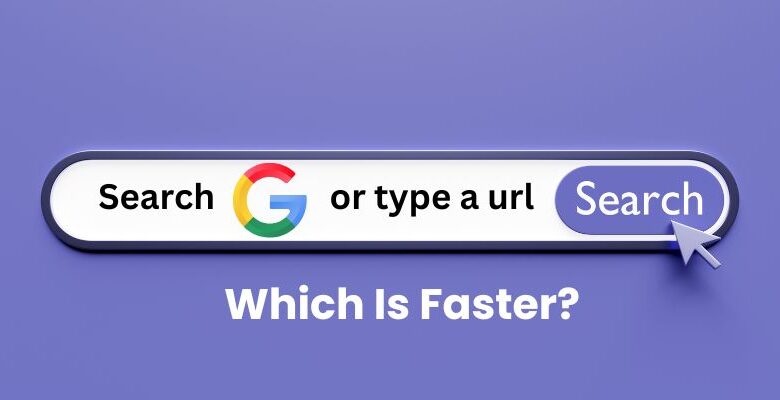
Google has become one of the most widely used search engines with over 4.97 billion users worldwide. There are lots of reasons why people love using this search engine and its search convenience is one of these reasons. It allows people to make a direct Google search or use a URL to access a website. Both of these methods are extremely useful and valuable in their own ways.
But if we talk about the “Search Google or Type a URL”, which one is faster? To understand this,
I am going to analyze both of these search methods in detail in this article. I’ll also cover the pros and cons of both of these methods to help you understand their nature better. Let’s start.
Search Google or Type a URL – A Brief Overview:
Before going into the details of the Google Search Vs. Direct URL debate, let’s discuss both of these methods briefly first.
What is Search Google?
Search Google is a method of looking for something on the Internet using the “search” feature available on Google. You can type almost any word or phrase in its search bar and it will give you all the relevant data instantly. You will images, videos, news, and even books related to the searched term. It is one of the main ways people look for stuff on the Internet.
What is Type a URL?
In the context of this debate, the Type a URL is a method of looking for content online by using its URL (Uniform Resource Locator). It is just like using the exact address of a website or a random video on the Internet and finding it instantly. It is a great way to look for something without receiving extra search results, unlike the Google Search method. This URL can be copied from anywhere and then pasted into a browser search bar to access the destination page.
Search Google Vs. Type a URL – Usage Methods:
Now, let’s take a look at how to use both of these methods.
How to use Search Google?
Using Google search is very simple. Here are its details:
Method #1 – On Chrome:
Chrome is powered by Google so you can use its omnibox to perform a direct search.
- Open the web browser.
- Click on the Omnibox.
- Type whatever you want to search for on the Internet.

- Hit the “enter” button.
- You will find all the relevant results.

Method #2 – On Google:
Another way to perform this method is by opening Google’s official website. It works both on Chrome or any other web browser like Firefox.
- Open the web browser.
- Search for “Google”.
- Click on the official site link.

- Now, type anything you want in the search results to find the relevant content.

Note: Chrome also provides the direct Google search option on its homepage.
How to Use the Type a URL Method?
Using the Type a URL method is also simple. Here are its details:
- Open any web browser of your liking.
- Copy the URL link of the destination content you want to access.
- For demonstration, I’m using the URL link to Wikipedia (https://www.wikipedia.org/ ).
- Click and paste the link in the Omnibox and hit enter.

- You will access your required website or any other piece of content.

Search Google Vs. Type a URL – Benefits and Drawbacks:
Now, let’s discuss both the benefits and the drawbacks of both of these methods.
Benefits of Search Google:
Google Search has lots of benefits when you look at it the right way. I’ve listed the best ones below:
- You get to access every type of content related to the searched term.
- There is no need to copy or memorize the complex URL links of content.
- It lets you find the most relevant and updated content.
- It is not affected by any minor spelling or search errors.
Drawbacks of Search Google:
Just like the benefits, this method has a few drawbacks as well.
- You might need to browse a bit in order to find something that’s not very popular.
- You have to go through multiple steps if you’re not using Chrome.
- The results are sometimes mixed with the paid ads. It makes finding the exact content a bit harder.
Benefits of Type a URL:
This method has a few benefits of its own.
- It helps access a website or any other content instantly if you have the right link.
- It doesn’t distract you with extra relevant content.
- You can instantly find content even if it’s not popular on the search engine.
Drawbacks of Type a URL:
Here are some of its drawbacks:
- Even a minor error in the link will stop you from accessing a site.
- You need to memorize or copy it from the source.
- Sometimes, these links direct you to web pages that no longer exist.
Which One is Faster?
I have comprehensively described the details of both Search Google and Type a URL along with their benefits and drawbacks. According to this analysis, using the Type a URL method is faster.
You only need to paste the link and hit enter to access it. There are no additional steps included even if you’re using a browser other than Chrome. However, keep in mind that you need to have an accurate link in order to execute this method.
Conclusion:
Search Google or Type a URL is a heated debate in the world of search engines. Google, being the most popular search engine in the world, allows people to make a direct query using normal words and phrases to find relevant content.
On the other hand, the URL method involves using a direct link to access content. These methods are very efficient in their own ways. Still, using the URL method is a little faster than the other one.
Frequently Asked Questions (FAQs):
Does a URL work if searched through Google’s search bar?
No. Google will only show search results related to the URL instead of opening the linked content.
Do other browsers besides Chrome perform Google searches through the Omnibox?
Yes. However, you may have to change the default settings of the browser first.
Which method is better for finding unpopular content on the Internet?
Using the URL method is better for finding unpopular content on the Internet.





